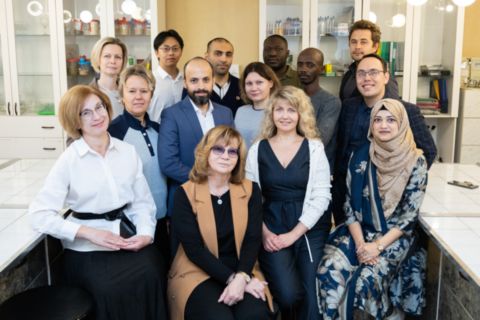In Russia, the Agriculture and Processing Industry Workers' Day is celebrated on the second Sunday of October every year. In 2025, this professional holiday is celebrated on October 12th and not only by agricultural workers, specialists and top managers of agricultural enterprises, workers of the food processing sector and food manufacturers, but also by the SUSU researchers, who study biotechnology and make a serious contribution to solving of relevant problems of the agroindustrial complex.
For several years now, the team of researchers from the School of Medical Biology of South Ural State University have been offering new technological solutions to important tasks in the fields of ensuring food security and sustainable development of the economy of our region. In close collaboration with our region’s Ministry of Agriculture and based on the food resources available in the Chelyabinsk Region, the scientists in the university laboratories are developing new approaches to processing of food raw materials in order to create unique food products targeting to prevent health problems.
With the support in the form of a regional grant from the Russian Science Foundation (RSF), managed by Doctor of Sciences (Engineering) and Professor of the School of Medical Biology Irina Potoroko, researchers from the SUSU Department of Food Technology and Biotechnology have created and patented a technology of grain disinfection using the non-thermal effects of cold plasma and ultrasound.
This unique method helps safely inactivate toxic moulds in a field of low-ionized gas and effects of cavitation, while not damaging the physiology of grain and preserving its useful properties, what makes this method a promising one for disinfection of grain mass at different stages of manufacture and storage in the agroindustrial complex. The processed grain can be safely used for food and forage purposes.
The team of researchers have proven that the proposed processing method is an effective tool for regulation of the sowing qualities of grain mass.
To minimize the risks of food losses, the School’s scientists have developed a technology of producing bioethanol from low-quality and defective wheat grain. The proposed hybrid approach is not widely used in Russia with regards to the ethanol technology, and it has been applied by the Chelyabinsk developers to rejected grain mass for the first time.
“We used two traditional technologies of bioethanol production in our research. And in order to intensify the process reactions and increase the yield of ethanol, we use the non-thermal effects of cold plasma and ultrasound,” shared assistant to the SUSU Department of Food Technology and Biotechnology Artem Malinin. “Such method allows not only to produce high-quality ethanol, but also to speed up the process of mixture fermentation more than twofold.
As part of the implementation of the “Technological Support of Bioeconomy” national project, Associate Professor of the SUSU Department of Food Technology and Biotechnology Svetlana Merenkova is developing resource-saving technologies of deep processing of cake meal generated as a result of mechanical linseed oil expression. In addition, the scientist proposed a new unique technology of producing of a fermented probiotic emulsion-type beverage based on linseed cake.
The Department’s Associate Professor Alena Ruskina is developing technologies of deep processing of potato of the Ural breeding and has patented an ultrasonic method of potato starch modification. After such processing the product becomes a highly-effective functionally-technological and healthy nutritive ingredient for manufacture of diet-and-preventive food and food for diabetic patients.
“We extract native starch from potato and use ultrasonic processing to change its structure,” explains Alena Ruskina. “Most often starch is modified using chemicals, and this is harmful for health. Our safe ultrasonic modification helps not only to structure starch, but even to make it healthy. The thing is that the obtained amylose starch fraction acts as a prebiotic (dietary fibre), is not digested in the upper gastrointestinal and has anti-inflammatory and immunomodulatory effects, what has been proven in silico.”
Today, South Ural State University sets itself an important task of attracting the investments of potential industrial partners, what facilitates the development of promising scientific projects and the obtaining of new applied results that are crucial for health protection and active ageing of the population.




